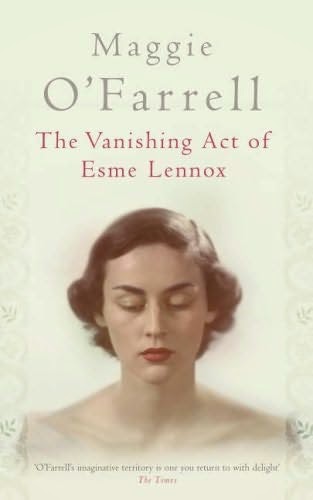Book #15
The Vanishing Act of Esme Lennox by Maggie O'Farrell
Edinburgh in the 1930s. The Lennox family is having trouble with its youngest daughter. Esme is outspoken, unconventional, and repeatedly embarrasses them in polite society. Something will have to be done.Years later, a young woman named Iris Lockhart receives a letter informing her that she has a great-aunt in a psychiatric unit who is about to be released.Iris has never heard of Esme Lennox and the one person who should know more, her grandmother Kitty, seems unable to answer Iris's questions. What could Esme have done to warrant a lifetime in an institution? And how is it possible for a person to be so completely erased from a family's history?
My favourite thing about this novel is the structure. It's written in multiple voice narrative, which is a favourite of mine, and flits the reader between past and present seamlessly. One of the narrators is suffering from Alzheimer's disease, and her accounts are incredibly disjointed and cliffhanger-esque. Just as she's getting to the point, she'll start talking about something completely unrelated, such as a biscuit that's been placed beside her. This results in a perfect balance of reader frustration and irresistibility. Each section provides another strangely shaped piece of the jigsaw we are to complete in 270 pages.
O'Farrell subtly shows us how society would treat a woman who didn't fit into their norms, and how easy it would be to institutionalise such a woman. Although I wasn't able to decide for myself whether Esme was truly mentally ill when she first went into the asylum, I am pretty sure she was by the time she came out. It was amazing to read of the reasons some of the women were put into Cauldstone (a name which annoyed me immeasurably), and although these types of places have now been mostly closed, it can be said that women are being restrained in more subtler ways these days.
The novel's ending felt totally contrived, almost as though O'Farrell had completely run out of ideas for both the plot, and all of the characters, and was entirely fed up of the whole thing. This wild ending was certainly shocking, and a good one, but would've landed better if more questions had been answered first.
I could have loved this novel; I certainly liked it, I couldn't put it down, was desperate to know the ending, and I did see a good few well-written, lyrical parts of the prose that impressed me. It had great potential, but there were a few missing components for me. Events are thrown at the reader in an attempt to shock, or to move the plot onwards, without any real justification or explanation for these events. Why are O'Farrell's characters behaving in this way? There was nothing given to us with any sort of perspective surrounding them.
This is a great quick read, and something to get the reader thinking. It's not a masterpiece, however, and it's disappointing as it has all the ingredients there to become one. A half-cooked loaf that didn't fully rise; I liked it, but wouldn't do it again.

